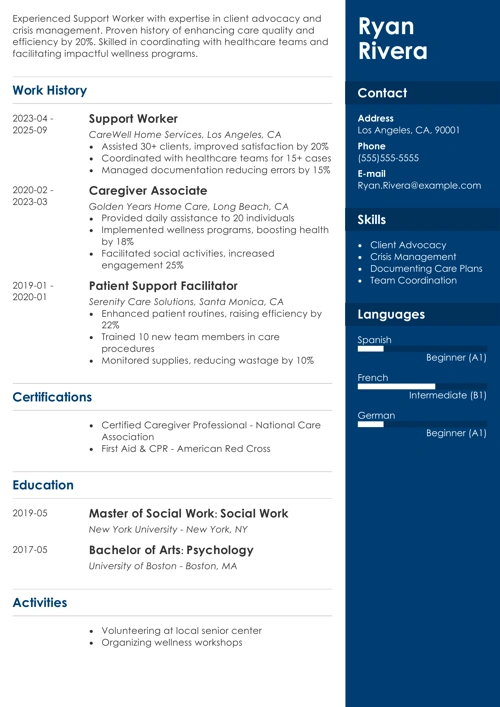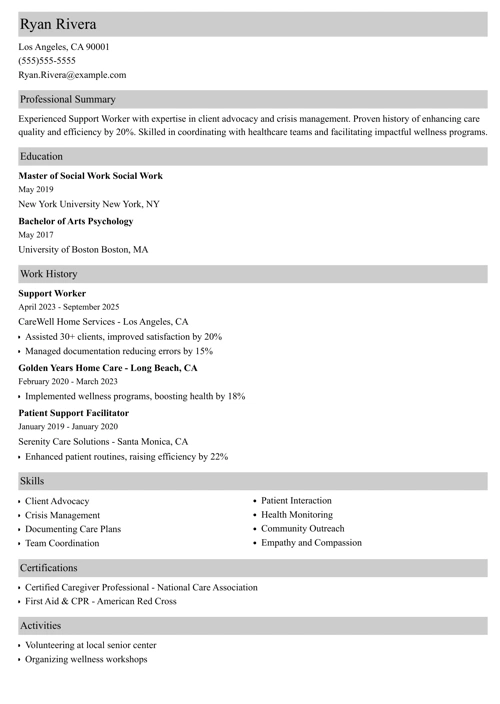Listing skills on a resume is one thing. You need them to prove you're the right fit for the job. But what about professional strengths to list on a resume? Are they the same thing?
Skills embody strengths. If you’ve excelled at managing a team, leadership is not just a skill but also your strength. Employers are not interested in candidates who simply know how to do certain things—they have specific strengths in mind. And they need proof.
Let’s take a closer look at the skills and strengths for your resume.
This guide will show you:
- What strengths to put on your resume to stand out from the rest of the candidates.
- How to pick resume strengths examples to cater to employer’s demands.
- A list of strengths for your resume you can use as inspiration.
- Ways to incorporate resume strengths across your resume, with a resume sample to guide you.
Want to save time and have your resume ready in 5 minutes? Try our resume builder. It’s fast and easy to use. Plus, you’ll get ready-made content to add with one click. See 20+ resume templates and create your resume here.
Sample resume made with our builder—See more resume examples here.
See our resume guides for freshers:
- High School Student Resume Example
- High School Graduate Resume Example
- Resume Templates for Students
- College Freshman Resume Example
- College Graduate Resume Example
- Undergraduate Resume Example
- Resume with No Experience Example
- Resume Examples for Teens
- Resume for Internship Position
- Resume Examples for All Jobs (for experienced and junior candidates)
Sample Strengths Resume Template
Maria J. Wilkinson
marisjwilkinson@gmail.com
(682) 463-5240
Dallas, TX
Summary
Resourceful and creative event planner and promoter with 6 years of experience in the events and advertising industries. Eager to join Plan A in supporting charity organizations through coordinating and promoting auctions and concerts. Oversaw successful organization and promotion of two 2000-guest trade shows, 24 concerts, and 37 ad campaigns. Exceeded expected event attendance by 20% by proactively engaging in marketing and promotion.
Work Experience
Event Planner
Blue Spark Productions and Management, Houston, TX
January 2016–March 2020
- Winner of the company’s Top of the Tops in 2019 for seeing through exceptionally successful events.
- Fostered relationships with event clients through exceptional customer service.
- Designed timelines and layouts for seamless event schedules.
- Spearheaded new marketing strategies resulting in a 20% increase in business in 2018 and 2019.
Marketing Promotions Assistant
LSI, Phoenix, AZ
September 2013–November 2015
- Actively involved in all aspects of the company’s ad campaigns.
- Successfully reconfigured weekly brainstorming sessions, resulting in increased efficiency and productivity.
- Brought in 8 new major clients through active networking and friendly approach.
Education
Bachelor in Marketing
Tilburg University, Holland
Graduation: May 2013
- Minor in communications.
Skills
- Organization
- Marketing
- Communication
- Complex problem solving
- Negotiation
- Judgment and decision making
Read more: How to Build a Resume
What Are Resume Strengths?
Resume strengths are things you’re best at, traits or capabilities that make you excel at your work. Often they are talents that let you exceed expectations. Sometimes, they are even special abilities you may not be aware of, because they’re part of who you are. To help identify your strengths, keep in mind that they are closely related to your personal values.
List of Strengths for a Resume—Examples
The best list of strengths to highlight on a resume is relevant to the job you’re applying for and targets traits employers look for as well as key jobs skills.
Here’s a general list of strengths for a resume:
- Detail-oriented
- Multitasking
- Technical skills
- Analytical skills
- Leadership skills
- Teamwork
- Interpersonal skills
- Effective communication
- Problem solving
- Organizational akills
- Critical thinking
- Decision making
- Marketing skills
- Writing skills
- Management skills
- Marketing skills
- Creative thinking skills
- Strong customer service skills
- Listening skills
- Collaboration skills
- Logical thinking skills
- Punctuality
- Work Ethic
- Negotiation skills
- Flexibility
- Adaptability
- Presentation skills
- Conceptual skills
- Microsoft Office skills
- Technical skills
- Time management
Interested in interview prep: What Are Your Strengths? and What Is Your Greatest Weakness?
These are not just resume strengths examples. The items above are strengths and skills. But what makes them your strengths is having a natural knack for using them. This is what the recruiters are interested in. All you need to do is to recognize yours, and to know how to highlight them in your resume.
See many more ideas for strengths to list on resume in:
- Words to Describe Yourself
- Core Competencies for Resume
- Employability Skills
- IT Skills
- Transferable Skills
- Computer Skills
- Soft Skills
- Hard Skills
- The Difference Between Soft Skills and Hard Skills
Making a resume with our builder is incredibly simple. Follow our step-by-step guide, use ready-made content tailored to your job and have a resume ready in minutes.
When you’re done, Zety’s resume builder will score your resume and our resume checker will tell you exactly how to make it better.
How to List Strengths on a Resume?
The strengths you sprinkle throughout your resume depend on the company’s needs. How to do it the right way? Just follow these steps:
- Read the job listing carefully to see what strengths their ideal candidate should possess.
- Now, make a list of your own strengths.
- Cross-reference both lists to decide which of your talents match.
- Showing your knowledge of the company’s needs shows enthusiasm, which can go a long way in assuring success not only before, but also after you get hired.
- Mention them in all of your resume sections starting from the summary of qualifications to the last section.
- Prove each ability by providing an achievement which illustrates them.
Our sample candidate’s strengths to put on a resume are organization and marketing.
See how the candidate highlights them on their resume... and learn how you can make your strengths stand out on a resume:
Last but not least, remember to attach a cover letter to your resume, and be sure not to start it with salutations such as To Whom It May Concern, or Dear Sir or Madam. According to a Forbes article, these types of cover letter greetings immediately tell the hiring manager that you don’t care enough about the job to do even the most basic research. See our guide on how to write a cover letter.
Plus, a great cover letter that matches your resume will give you an advantage over other candidates. You can write it in our cover letter builder here. Here's what it may look like:
See more cover letter templates and start writing.
Key Takeaway
Here’s a summary on how to build the perfect resume:
- Choose the best type of resume for you. The reverse-chronological resume format works best if you already have experience.
- Consider the font you’re using when deciding on the font size. Most acceptable resume fonts can be 12 points, while some sans-serif fonts can go as low as 10 points. When it comes to paper, go with white or ivory if you’re printing your resume.
- Add a resume introduction at the top of your resume to highlight your strengths and to show your interest in the job. Use a career summary if you have 2+ years of experience, and a career objective if this will be your first job in the field.
- Make your resume work experience section solid with bullets outlining your most impressive achievements. Begin every bullet with resume action verbs like fostered, spearheaded,assisted, coordinated, designed, etc.
- Be sure to include an education section. You can also add relevant coursework, Cum Laude, Dean’s List, GPA or studying abroad to your resume.
- Add a skills section that also includes your strengths.
- List professional certifications and licenses in their own section to make them stand out and impress.
- Improve your resume with additional resume sections if they further prove your strengths: language section, awards section, freelance work, projects, and hobbies and interests.
All that's left is to prepare for your interview with help from our guides on:
- Common Interview Questions
- What Makes You Unique
- What Motivates You
- Where Do You See Yourself in 5 Years
- Why Should We Hire You
- Tell Me About Yourself
- How to Introduce Yourself
- Describe Your Current Responsibilities
About Zety’s Editorial Process
This article has been reviewed by our editorial team to make sure it follows Zety's editorial guidelines. We’re committed to sharing our expertise and giving you trustworthy career advice tailored to your needs. High-quality content is what brings over 40 million readers to our site every year. But we don't stop there. Our team conducts original research to understand the job market better, and we pride ourselves on being quoted by top universities and prime media outlets from around the world.





